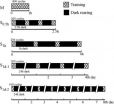(Press-News.org) A University of Exeter biologist has discovered a 'lost' species of bat breeding on the Isles of Scilly (UK). A pregnant female brown long-eared bat is the first of its species to be found on the islands for at least 40 years. It was discovered by Dr Fiona Mathews, Senior Lecturer at the University of Exeter, a postgraduate student and a team from the Wiltshire Bat Group.
The Scilly Isles Bat Group called in Dr Mathews and her team to help them find out more about bats on the islands. The researchers set up a radiotracking study, with funding from the Isles of Scilly Area of Outstanding Natural Beauty, to monitor the islands' bat activity.
The team solved the mystery of the annual disappearance of the large common pipistrelle colony on St Mary's by finding that the bats had moved to a new site. They also discovered that there were brown-long eared bats roosting in a pine tree.
Dr Fiona Mathews of the University of Exeter said: "We were surprised and delighted to find this brown long-eared bat and particularly excited that it is a pregnant female, as it suggests that there must be a breeding colony."
Brown long-eareds were last seen on the Isles of Scilly in the 1960s. Known as 'the whispering bat', these animals rely less on echolocation than other British bats and use their remarkably large ears to detect the sounds of caterpillars and their other prey on leaves. Because they only come out to fly when it is too dark to see them, and their calls are too quiet to be picked up on 'bat detectors', they are virtually impossible to detect using standard survey methods. The bats are very reliant on woodland, which is in short supply on the islands.
Dr Mathews continued: "We found this individual roosting in an old split Monterey pine tree planted by the shore as a wind-break, and feeding along avenues of elm trees. Now we know the bats are there, local conservation organisations can start to improve the habitat for them. This includes planting the tree species that attract night-flying insects, restricting lighting in key areas as it discourages the bats from coming out to feed, and ensuring that new trees are planted to replace the dying ones along the coastline.
"In addition, much can be done to provide suitable places for them to have their babies. Bats can live for over 20 years but breed very slowly. Because they do not build nests, the mothers must find locations which will keep their babies warm during the night whilst the adults leave the roost to feed. They will happily use lofts and bat boxes, as well as tree holes. The last known colony on the Isles of Scilly disappeared when their roosting site in a building was lost and now we have a chance to reverse their fortunes."
Mike Gurr, Chair of the Scilly Isles Bat Group added: "Since the formation of the IOS Bat Group in 2006, we have had sound evidence only for common pipistrelles being permanent residents and breeding in Scilly. This joint research project has confirmed the long-suspected presence of soprano pipistrelles as well but, most exciting of all, we now know for sure that we have brown long-eared bats living and breeding here. The work demonstrates what several people had long felt to be the case but could not prove. Studying these lovely creatures will be one of the IOS Bat Group's priorities for the next few years".
About brown long-eared bats (Plecotus auritus)
Brown long-eared bats have ears that are three quarters the length of their head and body
The bats fold their ears over when they are resting
They fly close to the ground so are vulnerable to predation from domestic cats
Their diet is largely composed of moths and caterpillars
The brown long-eared bat is one of 18 bat species known to live in the UK.
INFORMATION:
'Lost' bats found breeding on Scilly
2011-06-19
ELSE PRESS RELEASES FROM THIS DATE:
Discovery of a new mechanism of gene control that is associated with cancer
2011-06-19
Researchers headed by Joan Massagué at Memorial Sloan-Kettering Cancer Center (MSKCC) in New York and by María Macías at the Institute for Research in Biomedicine (IRB Barcelona) have identified a complex mechanism by which some proteins that are essential for life, called Smads, regulate the activity of genes associated with cancer. The fruit of three years of intense work, the study reports on the life cycle of this protein, a process that ensures that the protein is destroyed when it has completed its function. These results have been published today in the top journal ...
A better way to remember
2011-06-19
Scientists and educators alike have long known that cramming is not an effective way to remember things. With their latest findings, researchers at the RIKEN Brain Science Institute in Japan, studying eye movement response in trained mice, have elucidated the neurological mechanism explaining why this is so. Published in the Journal of Neuroscience, their results suggest that protein synthesis in the cerebellum plays a key role in memory consolidation, shedding light on the fundamental neurological processes governing how we remember.
The "spacing effect", first discovered ...
Tapeworm drug inhibits colon cancer metastasis
2011-06-19
A compound that for about 60 years has been used as a drug against tapeworm infection is also apparently effective against colon cancer metastasis, as studies using mice have now shown. The compound silences a gene that triggers the formation of metastases in colon cancer. Professor Ulrike Stein (Experimental and Clinical Research Center, a joint cooperation between the Charité Medical Faculty and the Max Delbrück Center for Molecular Medicine, (MDC)) and her research group made this discovery in collaboration with Professor Robert H. Shoemaker of the National Cancer Institute ...
Phobos slips past Jupiter
2011-06-19
VIDEO:
A movie of the encounter made by combining 100 images of the June 1, 2011 Phobos–Jupiter conjunction. The High Resolution Stereo Camera on Mars Express took this sequence.
Click here for more information.
Earlier this month, ESA's Mars Express performed a special manoeuvre to observe an unusual alignment of Jupiter and the martian moon Phobos. The impressive images have now been processed into a movie of this rare event.
At the moment when Mars Express, Phobos, and ...
Low fertility in Europe -- is there still reason to worry?
2011-06-19
The post-war trend of falling birth rates has been reversed across Europe, according to a new study. However, despite an increasing emphasis on family and fertility policies in Europe, this recent development involves social, cultural and economic factors more than individual policy interventions.
For some decades, couples have been having children later in life. But birth-rates among younger women have stabilised and the long-term trend towards lower fertility rates has been reversed.
Politicians are still left to grapple with problems associated with an ageing population ...
IOF calls for improved strategies to close the treatment gap and reduce future burden of fractures
2011-06-19
It pays to prevent fractures. That's one of the main findings of a landmark report 'Osteoporosis – Burden, Healthcare provision and Opportunities in the European Union' newly published in the journal Archives of Osteoporosis. The study, compiled by the International Osteoporosis Foundation (IOF) in collaboration with the European Federation of the Pharmaceutical Industries and Associations (EFPIA), calculates the future burden of fractures as a consequence of increasing treatment uptake in the five largest European countries as well as Sweden.
Fragility fractures, which ...
US Medicaid drug lists cost more, deliver less
2011-06-19
The U.S. Medicaid program is likely paying far more than necessary for medications and not offering patients the most effective ones available, by ignoring international evidence-based lists of safe and effective medications, according to a new study by researchers at University of California, San Francisco.
The study, which compared the Medicaid program's Preferred Drug Lists in 40 states nationwide against the World Health Organization's 2009 Essential Medicines List, found that the medications that are automatically paid for by the state-run Medicaid programs vary ...
University of Louisville surgeons perform first prosthetic bypass graft with patient's stem cells at point-of-care
2011-06-19
LOUISVILLE, Ky. – The first three patients to undergo an investigational surgical procedure for peripheral vascular disease that involves the patient's own stem cells continue to do well, reports the University of Louisville surgeon who is the principal investigator.
The "TGI-PVG IDE" clinical trial initiated at UofL involves using a patient's own stem cells to line man-made bypass grafts to better the chances at saving the limbs of patients with peripheral artery disease. Charles B. Ross, M.D., chief of the Division of Vascular Surgery and Endovascular Therapeutics, ...
NASA's James Webb Space Telescope completes first round of cryogenic mirror test
2011-06-19
The first six of 18 segments that will form NASA's James Webb Space Telescope's primary mirror for space observations completed final cryogenic testing this week. The ten week test series included two tests cycles where the mirrors were chilled down to -379 degrees Fahrenheit, then back to ambient temperature to ensure the mirrors respond as expected to the extreme temperatures of space.
A second set of six mirror assemblies will arrive at Marshall in late July to begin testing, and the final set of six will arrive in the fall.
The X-ray and Cryogenic Facility at NASA's ...
How Long Do Breast Implants Last?
2011-06-19
When you are considering breast augmentation it is common to wonder how long the implants will last. Stories abound about leaking implants and implant ruptures, causing some women to seriously consider if this procedure is safe and long lasting. It is important to remember that no medical device can last a lifetime. Like all medical devices, breast implants can, over time, wear down and require replacement.
Why Breast Implants Fail
A majority of breast implants last for ten to 25 years. Some women may enjoy a longer lifespan and others may have to replace their breast ...



